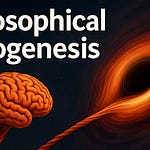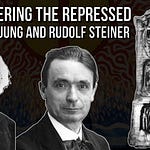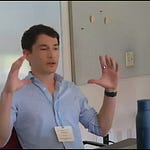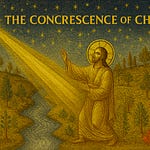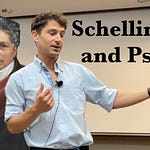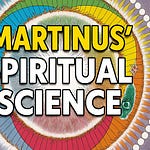Plato’s Timaeus rivals the Bible as one of the West’s most generative texts. It represents an ambitious synthesis, integrating earlier philosophical perspectives into a complex cosmological myth that attempts to build a bridge between the sensible and intelligible realms.
Tim and I plan to devote an entire session to the Timaeus itself at some point, but in this dialogue we focused on Schelling’s 1794 Timaeus essay and a contemporary article by Tyler Tritten titled “On Matter: Schelling’s Anti-Platonic Reading of the Timaeus.” Schelling began reading Plato in the original Greek in his early teens. Written when he was 19, his Timaeus essay turns a Kantian lens on the ancient dialogue, offering a creative inversion of traditional interpretations of Platonism as a two-world dualism.
In the Timaeus, Plato tries to synthesize the theory of forms (the realm of intelligible Ideas) with the so-called “necessity” or “unruly materiality” that resists purely rational ordering. This “necessity,” or ananke in Greek, is linked to chance, contingency, and the factor of reality that cannot be fully subdued by intellect. Timaeus’s cosmology therefore offers us a “likely story” rather than a definitive, perfectly self-consistent explanation.
Tim and I stressed that Plato’s text is both generative and problematic: it invites centuries of interpretation. Philosophers from Schelling to Jung to Whitehead read it in ways that highlight the difficult “third” element—a mediating factor between perfect Ideas and raw matter.
We noted how the chōra is depicted as feminine (“nurse,” “mother,” “wet nurse of becoming”) in contrast to the demiurgic paternal principle. In Timaeus’s mythic language, the “Father of all” (the divine craftsman) shapes the “Mother” (the chōra), yet that motherly power also stands on its own as a matrix of possibility. Tim emphasized that in a modern mechanistic reading, matter is often taken as purely passive, yet Plato’s “necessity” (and the generative chōra) has a strange autonomy—an “unruly” or “wandering cause” that cannot be perfectly harnessed by the divine intellect.
Where Plotinus privileges the One or Intellect as highest, Schelling often suggests that Soul or Nature (the dynamic, living principle) is prior in certain respects—even a co-eternal ground with Intellect. He says one can have Soul without Intellect but not Intellect without Soul, thus elevating the animating, vital power that mediates between forms and matter.
We compared Plato’s cosmology to the mechanistic turn in modern science, noting how figures like Newton preserved a Platonic sense of eternal laws in a “moving image of eternity.” However, Newton canceled the living dimension of matter and replaced the Timaean chōra with the fully deterministic geometry of homogeneous space. More recent scientific developments—statistical mechanics, evolutionary theory, theories of self-organization, and complexity science—are reversing the Newtonian-Laplacian program by reintroducing genuine contingency, creativity, and open-ended evolution back into our cosmology.
We stressed the importance of recognizing a continuity between physics and biology, matter and life, but without trivializing the emergence of organisms and consciousness.





